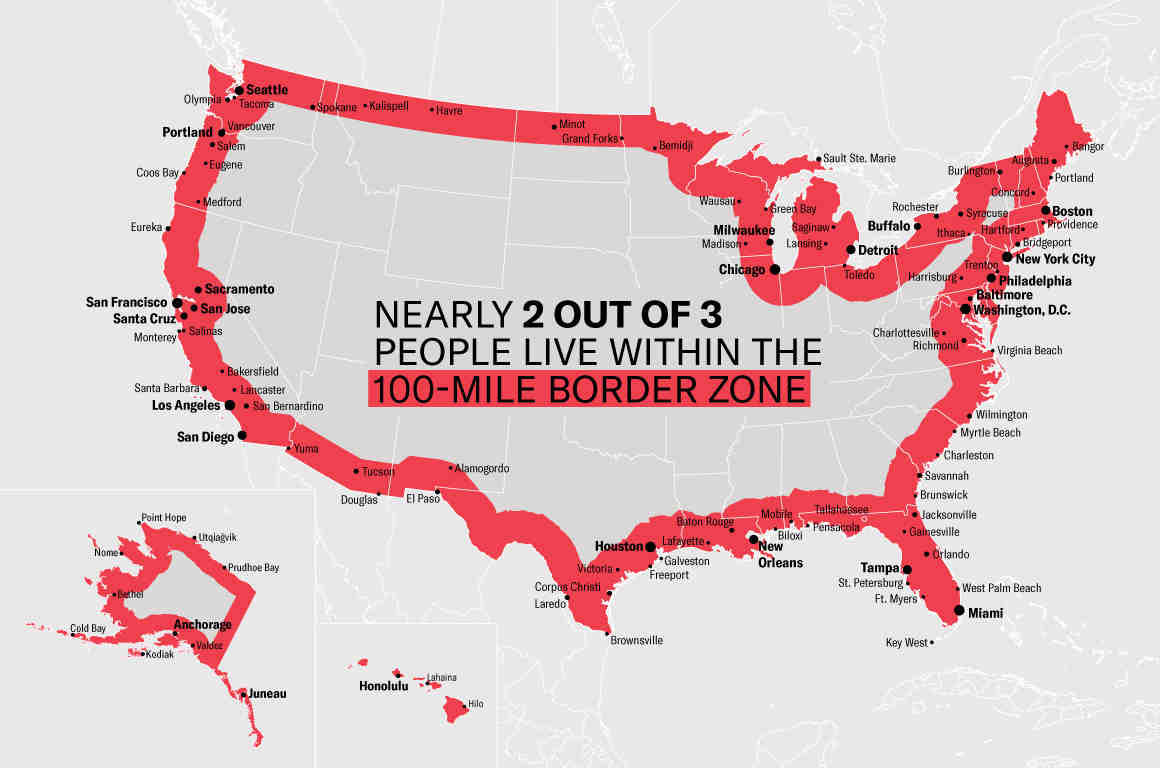Traveling domestically, while simple for most, can be complicated and potentially risky for immigrants in the United States. Given the current political climate and constant policy changes, we’ve received many inquiries about travel safety within the U.S.. While each situation is unique, we’d like to offer some general travel advice.
Remember that this advice can change at any time; the situation is fluid. Additionally, there are no guarantees with immigration, so carefully weigh the pros and cons before making an informed decision.
Traveling Near the Border
Many people think that immigration is only a concern at official border crossings. However, Customs and Border Patrol (CBP) has immigration checkpoints up to 100 miles from any U.S. border—including coastal ones. In fact, nearly 60% of the U.S. population lives in areas where Border Patrol can stop and question individuals about their immigration status.

Photo credit to the ACLU https://www.aclu.org/know-your-rights/border-zone
For undocumented immigrants, these areas are particularly dangerous, as immigration encounters could lead to detention and potential deportation. Even LPRs and visa holders should be careful and always carry proof of their status. Bus and train passengers in these zones may need to show documentation, and airport travelers may face additional screenings.
When immigration officers conduct stops, they are typically looking for identification documents, proof of legal status or citizenship, and any evidence that might justify detaining an individual. In many cases, immigration officers will attempt to extract additional information casually. You are not required to provide information beyond your name unless you are under arrest. Be cautious, remain silent, and refuse to answer questions about your immigration history, how you entered the country, or your nationality. Providing any information beyond what is legally required could be used against you.
Traveling Within the U.S.
While travel between states is generally safe, some states have enacted strict immigration enforcement laws that increase the risk of detention for undocumented individuals. Certain states have laws that require cooperation between local law enforcement and Immigration and Customs Enforcement (ICE), meaning that even minor infractions could lead to detention.
Air travel within the U.S. presents additional concerns, as the Transportation Security Administration (TSA) can share passenger information with ICE and CBP. Facial recognition technology is also more common at airports and, although it can be declined, it may lead to more screening.
For those on visas or with pending cases, it is crucial to carry valid identification and follow the visa conditions.
Traveling to U.S. Territories and Noncontiguous States
For those traveling to places like Alaska, Hawaii, Puerto Rico, Guam, or the U.S. Virgin Islands, it is important to remember that, while they are part of the U.S., flights can sometimes be diverted to foreign countries due to emergencies or technical issues. This can be a significant risk for undocumented immigrants, as being forced to land outside U.S. jurisdiction could mean that they can no longer return. Some U.S. territories also have different immigration policies, such as American Samoa. This means that there may be different entry and residency requirements.
Regardless of immigration status, travelers should always carry their immigration documents and be familiar with any special regulations that may apply to their specific destination.
Protecting Yourself While Traveling
Planning ahead and getting advice from an immigration attorney before traveling can help ensure a safer trip, regardless of your immigration status. This includes understanding the potential risks and legal implications involved, as well as researching your travel routes and the laws of the states you’ll be passing through.
Creating a safety plan is also crucial. This involves designating emergency contacts, memorizing essential phone numbers, and protecting your electronic devices with strong passwords rather than fingerprints or patterns. For parents, establishing a power of attorney (POA) can ensure your children’s care in unforeseen circumstances.
Remember that you have constitutional rights that protect you during encounters with immigration enforcement. Whether at an airport, border, train, or public area, you have the right to remain silent and don’t have to answer questions about your immigration status or origin if stopped by ICE or CBP. Law enforcement needs your consent to search without a warrant, and you have the right to request an attorney and should never sign any documents without legal counsel.
By knowing and asserting your rights, you can protect yourself from unlawful questioning or detention.
Final Thoughts
For immigrants, travel, even domestically, is never as simple as just packing your bags and going. There are risks involved for all immigrants, though they can vary based on your immigration status, destination, and mode of transportation. If you are planning a domestic trip, prepare, know your rights, and seek legal advice—it can make all the difference.
If you have any questions or concerns about how travel might affect you, our team is here to help. We can assist you in making informed decisions about your travel plans.
For information on international travel, read our blog here.


